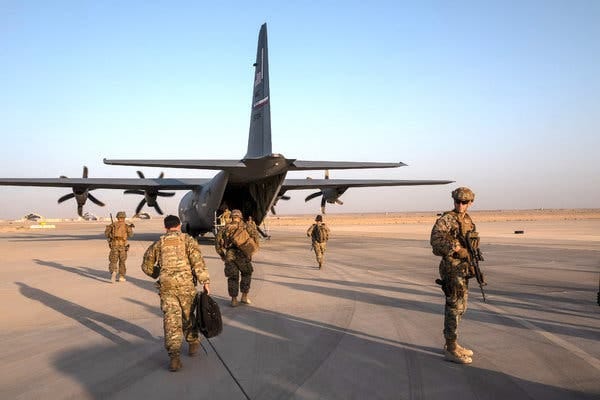New Evidence Confirms Russia's Bounty on American Troops
The Insider has uncovered new evidence confirming that Russia placed bounties on American troops in Afghanistan.

Read the full investigation at The Insider
2020 New York Times investigation
In 2020, a bombshell report from The New York Times revealed that American intelligence officials had uncovered a covert Russian operation offering bounties to Taliban-linked militants to kill American and NATO troops in Afghanistan. The Russian military intelligence unit behind this operation, Unit 29155, was already infamous for its subversive activities across Europe, including assassination attempts and destabilizing operations.
The intelligence was clear and alarming: Russia was paying for the deaths of American service members in Afghanistan.
Despite this, the Trump administration downplayed the investigation in 2020. Now, as more evidence emerges from The Insider, the question remains: What will Trump do as he continues to cheerlead for Russia?
2020 NYT: Russia Secretly Offered Afghan Militants Bounties to Kill U.S. Troops, Intelligence Says
In 2020, despite the gravity of the findings, the Trump administration failed to act. Though the White House was briefed and internal discussions ensued, Trump — known for his accommodating and loyal stance toward Putin — did not authorize any response. In fact, it was reported that Trump even chose to downplay the threat, with the White House opting not to impose sanctions or issue a diplomatic protest to Moscow. Trump even refused to confront Putin directly about the bounties on U.S. troops during a call, further avoiding accountability on the issue.
This inaction came at a time when Trump was heavily involved in talks with the Taliban, aiming for a deal to end the Afghanistan war. The situation seemed to align with a broader pattern in Trump’s foreign policy, where protecting Russia appeared to take precedence over U.S. national security— and in this case U.S. troops.
2025 The Insider: Afgantsy Redux: How Russian military intelligence used the Taliban to bleed U.S. forces at the end of America’s longest war
Fast forward to 2025, and new evidence has emerged through an investigation by The Insider that goes far beyond the intelligence initially briefed to American officials in 2020. The investigation delves deeper into Russia’s covert operations in Afghanistan, revealing direct links between Russian operatives and the Taliban — relationships that were instrumental in Russia’s broader hybrid warfare strategy against the West.
One key figure in this emerging network is Alexey Arkhipov, a GRU liaison with the Taliban, who was also featured in the 2023 documentary Hollywoodgate—which focused on the U.S. withdrawal from Afghanistan and the subsequent Taliban takeover.
The investigation also uncovered a chilling new piece of evidence: a hand-written memo discovered in Arkhipov’s inbox. The memo, written in Pashto and translated into Russian, reveals direct requests from the Taliban to the GRU.
“The new Islamic government seeks assistance to bring stolen helicopters and airplanes to Afghanistan from Tajikistan and Pakistan, assistance in training our security officers, and general assistance in rebuilding our defense capabilities.”
The memo further requested that Moscow prevent “the activity of enemies of the new Islamic rule from the territory of Tajikistan,” referring to former Afghan government officials who had fled to Tajikistan after the fall of the Ghani government.
This memo illustrates the growing alliance between Russia and the Taliban, as the latter sought Russia’s military expertise to solidify control over Afghanistan and strengthen its defenses. Desperate for resources to secure their hold on power and fend off opposition forces, the Taliban found a willing partner in Moscow — one eager to offer covert assistance in exchange for strategic leverage.
GRU Network: Covert Operations to Target U.S. and Coalition Forces
In addition to the memo, The Insider’s investigation has uncovered details of a secretive Russian operation aimed at targeting U.S. and coalition forces over several years. The GRU, Russia’s military intelligence agency, funded various terrorist groups in Afghanistan to execute attacks on American and NATO troops. This covert program utilized a gemstone trading company as a front, creating a network of Afghan couriers who were tasked with delivering funds to Taliban fighters and other militant groups. Once these couriers completed their missions, they were provided with Russian documents and granted asylum in Russia, further solidifying the covert ties between Russia and Afghan militant groups.
These new revelations raise troubling questions about Trump’s handling of intelligence regarding Russian bounties. Why was this intelligence ignored? Was there an effort to appease Moscow and keep talks with the Taliban on track, even at the cost of American military lives? Trump’s handling suggests a deliberate attempt to protect Russia, even as the GRU was supporting groups responsible for the deaths of American service members.
The Cost of Inaction: How Trump's Reluctance to Confront Russia Endangered U.S. Troops
In the years following the 2020 reports, Russia’s growing influence has continued to destabilize global geopolitics, with the Taliban, once a pariah, now empowered by Russian support. The bounties program, initially downplayed, is now part of a larger covert Russian effort to undermine the West.
Trump’s failure to act in response to intelligence about Russian bounties raises critical questions about U.S. foreign policy priorities. This inaction wasn’t just a missed opportunity — it was a dangerous pattern that jeopardized American lives and weakened U.S. national security. With this evidence, the question remains: will Trump continue to praise Putin, even as new evidence emerges showing that Russia did issue bounties to kill U.S. troops?
Congress must launch an immediate investigation into the failure to confront Russia's covert operations and its deadly impact on U.S. troops.
Thank you for reading! In times like these, I believe information should always remain accessible. If you’d like to support this newsletter and help keep it free for everyone, please consider becoming a paid subscriber. Your support makes a big difference, and I truly appreciate it ❤️





